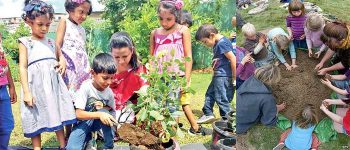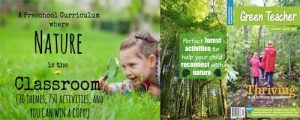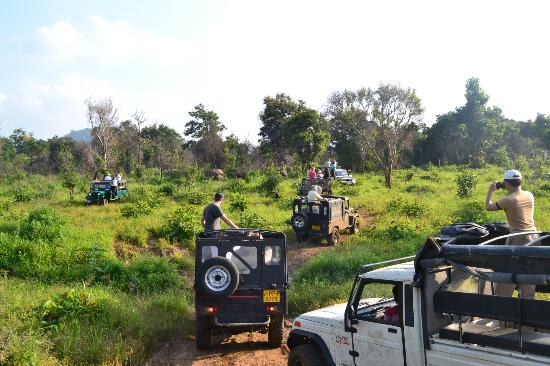Is your Child Suffering from Nature Deficit Disorder?

Nowadays children spend very little time with nature, and therefore the opportunity to enjoy nature, learn from nature, and develop nature based skills is minimum. Nature Deficit Disorder is a coined phrase which explains the human costs of alienation from nature. This brings about the idea that human beings, especially children, are spending less time outdoors, and that this situation results in a wide range of health issues related to their sedentary lifestyles. Nature Deficit Disorder is not a medical diagnosis but highlights the negative impacts that the children could face by alienating from nature.
Richard louv introduced the term “Nature Deficit Disorder” ( NDD) or coined this phrase in 2005 with the publication of his book “ Last Child in the Woods: Saving our child from Nature Deficit Disorder. Louv’s book published in 2011, “The Nature Principle: Reconnecting with Life in a Virtual Age,” extends the conversation to include adults, and explored this key question: “What could our lives and our children’s lives be like if our days and nights were as immersed in nature as they are in technology?”
The main reasons for alienation from nature is, proliferation of electronic communications; poor urban planning and disappearing of open space for enjoying outdoors; congested living conditions, lack of time for spending outdoors, diminished importance of the natural world in public and private education; and parental fears due to increased rates of child abuse and crimes.
Scientific evidence suggests lack of outdoor activities contribute to a diminished use of the senses, conditions of obesity, and at times may cause emotional and physical illnesses. Research also suggests that the nature-deficit condition weakens ecological literacy and stewardship of the natural world.
Lack of activity is identified by health experts and call it “epidemic of inactivity,” which is widely found in the western world.
Connecting People to Nature’, was the theme selected for World Environment Day 2017, which highlighted the issue of alienating from nature, and the importance of encouraging to get outdoors and into nature, to appreciate its beauty, diversity, ecological services, clean environment and its importance, and to take forward the message to protect the nature, which nurtures us.
If the children are alienated from nature, will they tend to understand the importance of nature, love the environment and tend to protect the environment? is a question that needs to be raised, expressing the need to connect children to nature. Following are few simple suggestions to get connected to nature, where there are many more ways to get connected to environment.
- Go outside and explore your garden.(if you have one) or near by park.
- Water the flower/vegetable beds or pots
- Plant a tree
- Walk on the beach
- Get involved in environment cleanup programmes.
- Go on a hike or a nature walk.
- Get involved with a nature club
- Bird watching
- Visit a nature park/sanctuary.
How much of time do the children of our country have, to connect with nature. The children are overloaded with school work and tuition, with less practical opportunities, Do nowadays children have time to enjoy outdoor activities, or enjoy childhood?. Practical environmental activities in schools will provide an opportunity for the children to get connected to nature and enjoy outdoor activities.
It was observed that during disaster situations the children who had the skills, had better opportunities of surviving. For an example, most of the children who could swim survived the Tsunami, this is true with floods, the quick correct decision making at a disaster situation comes from practical exposure. Therefore it is essential that children be equipped with relevant skills to face disasters induced by climate change, the current issue of concern.
It is obvious that the young generation is getting addicted to electronic devices, and tend to spend many hours at a stretch with the electronic devices. Therefore the “National Day of Unplugging” was introduced to highlight this issue and provide an opportunity for the children to connect with nature.

The National Day of Unplugging was created by Reboot, a nonprofit Jewish community that was originally established in 2003.This day falls on the second Friday in March every year. The idea behind the day was to challenge people to keep their electronic devices unplugged and unused for 24 hours in order to give themselves the chance to take a break and spend time relaxing with family, friends, or engage in environmental activity. This is important not only for children, but also for adults, regardless of race or religion. Reboot believes that such time taken to “reboot” or systems will make us happier, more content with our lives, and more aware of the things that matter including the natural environment around us. Many spend their time under artificial lights in an office, under air conditioning. Therefore it is very important to get out of the system and enjoy nature.
Unplug your devices and take a walk in a park, or any place where you can enjoy nature. .Take the time to observe the way the birds fly, the way the water flows in a stream, or how the animals behave. As human beings are part on nature we must be able to enjoy the nature. It is observed that at natural disaster situations animals sense it and move away from these sites, human beings too had this sense, but with alienation from nature, we have lost these abilities. As environment provides all our basic needs like air, water and food ,we need to get more connected to nature, as no one can live without nature.

We are so glued to the modern technology but exploration of and nature will give an opportunity for new innovative creations.
Humans have always copied nature, and tried to re -create many things. A flying bird has influenced to develop an aeroplane. The present generation will see the aeroplane before they see a bird. As the children are glued to the modern technology they see nature through the screens of electronic devices, where they are less observant about the world around them. It was observed that children learn more and behave better when lessons are conducted outdoors.
How can we bring nature back in to our lives?
At present people are moving more indoors with the current way of living. Many organizations and networks of different agencies have come forward to change this situation.
The Children & Nature Networks have encouraged and helped people to reconnect children with nature. It is believed that more research is necessary to better define the influence of nature experiences on human development. On the other hand Dr. Howard Frumkin, Public Health Specialist, University of Washington, says, “we know enough to act.”
As children have limited respect for their immediate natural surroundings,. Louv believes that the effects of nature deficit disorder on our children will be an even bigger problem in the future if this continues. This situation can be changed or reversed with little effect.
Louv claims that “studies of students in California and country wide show that schools that use outdoor classrooms and other forms of experiential education produce significant student gains in social studies, science, language arts, and mathematics.
Recent research has drawn a further contrast between the declining number of National Park visits in the United States and increasing consumption of electronic media by children, which has become the trend all over the world. Therefore more opportunities should be provided for children to get connected to nature, through households, schools, organizations and social networks,

Future education reforms must widen the definition of the classroom. To help young people learn in nature, not just about nature. Policy -makers must take an effort to incorporate natural environment as new schoolyards as much as possible. Nature-oriented preschools should be promoted, “Green Schools” or environmental friendly school yards will give an opportunity for the students to enjoy nature and get connected with nature, and love nature.
Sujeewa Fernando
Assistant Director
Environment Pollution Control & Chemicals Management Division
Ministry of Mahaweli Development and Environment






